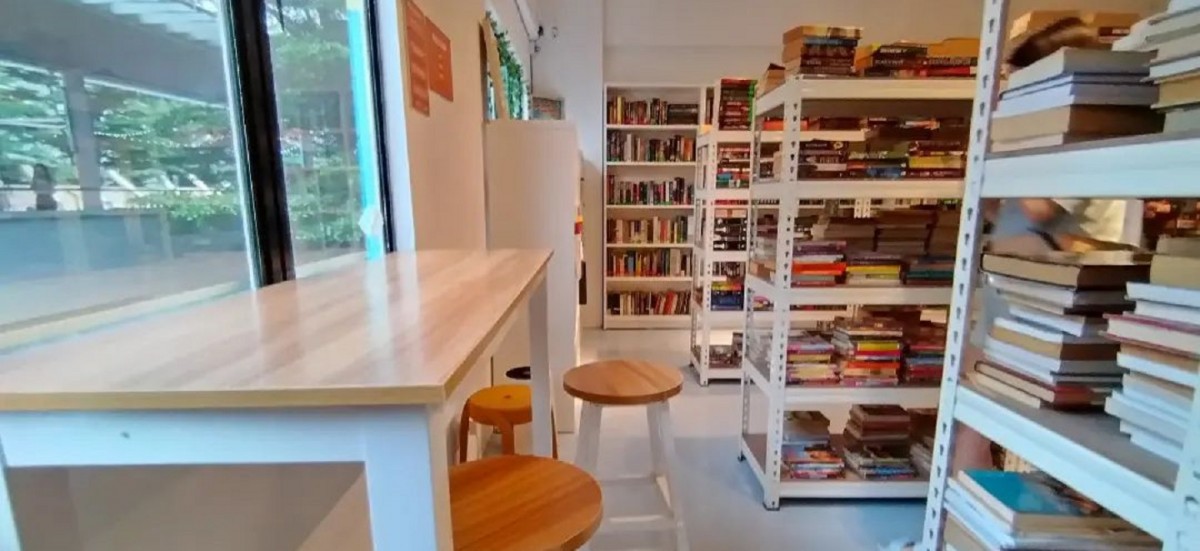Belief in the integrity of people who love books convinced Philip Yong that an unstaffed store would work. In February it opened BUKU by PJ PreLoved House, a year after selling books online. Last month, to accommodate more titles, it moved the physical setup to a larger plot in the same building on Mahsa Avenue in Kuala Lumpur.
It’s the beginning, but he is convinced that a self-service bookstore works: “The only thing that has been stolen is a bottle of disinfectant!”
Yong sources from recycling centers and charities, as well as readers who like to donate books after reading them. It also collects donations from hoarders – those who buy with the intention of reading but don’t actually get started. “You go to their house and there are stacks of books.”
A digital product manager during the work week, he steals BUKU when he can to restock the racks and clean up the place. His favorite titles sell for RM5 to RM15 and customers pay using a QR code or online transfer.
“I like the idea of reusing books,” he says. “I have always wanted to start a community library, but it is very difficult to maintain one, financially and in terms of resources. So why not a second-hand shop with books at affordable prices?
“Online customers were asking for a physical store because they like to turn the pages to see the condition of a book and get a feel for it. At first it was like an experiment: how would a retail outlet work without staff? and cashless? It’s a calculated risk; my online business has given me the confidence to start this. I’ve found people to be really honest.
What also surprises him is that young people, in particular, choose books of different genres. “We get a lot of people who are just starting to read. What we have is more affordable for them, compared to established stores. I don’t mind if they come in, pull out a book to read, and bring it back later.
“It’s definitely long-term. I also consider BUKU a personal library,” adds Yong, who enjoys biographies, historical works, and self-help and business titles. He credits his teacher mother for kindergarten exposing him to books from an early age.
In the future, he hopes to organize book exchanges or have individuals gather together and set up kiosks to sell what they have in or around his store. As he envisions it, “essentially, a book community that comes together.”
At Dokusho Bookstore, husband-and-wife owners Ooi Jian Sheng and Sin Yi Wen see themselves as “a social enterprise that wants to be part of something bigger than ourselves. We want to be part of a community that thrives together.”
In February, after five years of operating online, the used book specialists felt ready to run a physical outlet in an office lot along Old Klang Road, KL. They have about 8,000 titles in Dokusho – Japanese for “the act of reading” – and a separate batch of 5,000 online.
“Space is always at a premium in our business. In fact, our store layout has changed several times because we are always looking for ways to optimize and fit in more books,” says Ooi.
They get their supplies from various non-governmental organizations that have been working with them for a few years. People who want to pass on old books can support Dokusho’s Read, Rehome, Recycle program. To ensure that financial constraints do not deprive children of the pleasure of reading, the duo have set up a children’s book bank which allows them to bring back up to five free books per visit.
The physical store is only open on Saturdays and Sundays because Ooi and Sin – classmates from the same British university, who returned to Malaysia in 2015 – have full-time engineering jobs. Most of their pre-loved stock is priced at RM7.90 – “a great place that makes financial and marketing sense” – and 7.9% of monthly revenue goes to Teach for Malaysia programs, which they see as being in line with their purpose. to educate.
Lessons learned online since 2017 are translating into the building blocks for their bricks-and-mortar setup. Questions – such as where and how to keep inventory, and who will handle logistics and customer questions and complaints – arose as they refined their business.
The experience taught them to completely discard their preconceptions about reading habits. Even the most obscure book can be repatriated, they found, and Malaysians in general are interested in a wide range of subjects. “A memorable book we sold was about mosquito research!” says Ooi, who picked up the habit of reading from her parents, both avid readers. Being head librarian in high school also gave her an excuse to be in the library!
“A good memory I have is that we used to fight over the ‘play queue’ before Harry Potter and the Goblet of Firethe exit. My mom was first in line and she took the day off to start once we picked her up from the store. I still remember staying up all night and reading the book cover to cover.
He and Sin plan to move Dokusho to a larger, more accessible, and strategic location, where they can dedicate space to a wheelchair-friendly community learning center. There, children and adults will have free access to literacy and essential life skills. “We want to build and be part of a vibrant, holistic community.”
This article was first published on August 8, 2022 in The Edge Malaysia.

